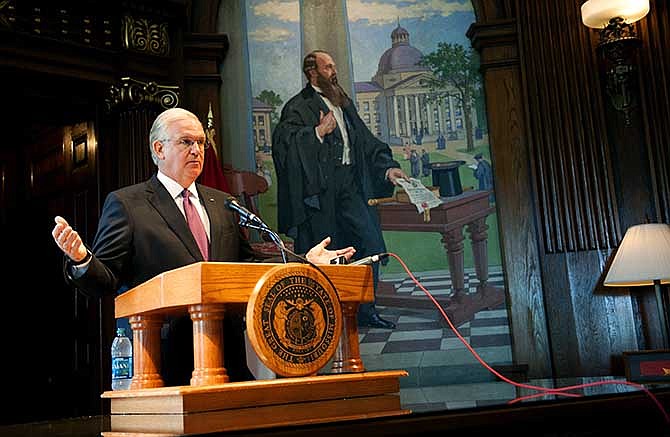JEFFERSON CITY, Mo. (AP) - Missouri Gov. Jay Nixon vetoed or froze more than $1.1 billion in spending Tuesday, citing concerns about declining revenues and the potential for new tax breaks to drain state dollars even further.
Nixon's budget cuts include nearly $276 million in line-item vetoes and $846 million in spending restrictions affecting public education, the Medicaid health care program, job-growth initiatives and repair work at numerous state buildings.
The Democratic governor said his actions were necessary because the budget approved by the Republican-led Legislature was "dangerously out of balance."
"This is economic reality," Nixon said at a news conference.
Missouri's new budget is to take effect July 1.
Nixon's actions mean there will be no funding increase for public school districts, colleges or universities when the new school year begins. But the governor said the education money would be the first to be released if legislators in September sustain his previously announced vetoes of bills granting special tax breaks to a variety of industries and organizations.
Republican legislative leaders accused Nixon of playing political games with the budget. Senate Appropriations Committee Chairman Kurt Schaefer said the governor was "holding school kids hostage" to try to get his way on tax policy and a proposed Medicaid expansion.
"I am saddened that once again our children's education is being used as a political pawn," said House Budget Committee Chairman Rick Stream, R-Kirkwood.
In addition to education funding, Nixon also put a hold on state employee pay raises, expanded child care subsidies and the restoration of dental and therapy coverage for adult Medicaid recipients that had been eliminated a decade ago. All of those could later be released at Nixon's discretion.
The vetoed items include funds for job training, payment increases for health care providers, a new trade office in Israel and the renovation of a Jefferson City hospital as state office space. To enact those would require a veto override vote by two-thirds of the legislators in each chamber.
Nixon said he was eliminating 260 full-time state positions and closing 19 regional state offices, including seven for the Department of Revenue and six each for the departments of Mental Health and Natural Resources.
This marks the second straight year that Nixon has used budget restrictions as a means of gaining leverage over lawmakers during the September veto session.
Last year, Nixon froze about $400 million for education, health care and other programs, releasing the money only after the Legislature failed to override his veto of an income tax cut bill. Last year's battle came despite the fact that Missouri revenues had surged above expectations.
Missouri's tax revenues currently are 0.2 percent below last year's, with only a week remaining in the fiscal year, said Nixon's budget director, Linda Luebbering. Revenues also are running well short of the projections upon which next year's budget was based.
All told, Nixon froze or vetoed $786 million of expenses from general state revenues and $336 million dependent upon federal or other funding sources. Of those general revenue cuts, a little over half are attributable to the shortfall in tax revenues, Luebbering said.
Nixon said the budget reductions also are partly due to erroneous legislative assumptions about tobacco settlement revenues and the Legislature's failure to enact an amnesty program to encourage people with overdue taxes to pay.
He said the Republicans' refusal to expand Medicaid eligibility has worsened the state's finances by rejecting a potential influx of billions of federal dollars available under President Barack Obama's health care law. Republicans contend that Medicaid expansion would be too costly for the state in the long term.
Luebbering said more than $200 million of Nixon's budget reductions are due to the potential for lawmakers to override his vetoes of various tax-law changes, including bills offering sales tax breaks to computer data centers, electric companies, restaurants and fitness centers.
Republican lawmakers have questioned Nixon's figures and defended many of the tax-break bills as mere corrections of tax policies that they say have been wrongly applied by the courts or Nixon's administration.
Business groups urged lawmakers to forge ahead with veto override attempts on the tax-break legislation.
While Nixon blamed lawmakers for causing the budget cuts, Schaefer said the governor should bear the responsibility for declining revenues.
"The governor's lack of economic policy in the state of Missouri is having a faster and more detrimental effect than anyone realized it would," said Shaefer, R-Columbia.


